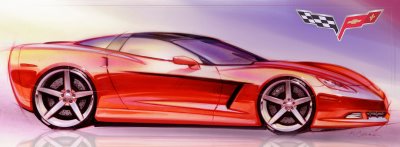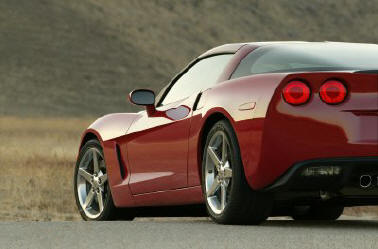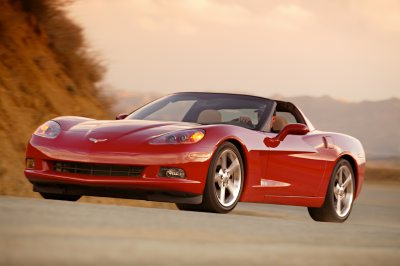|
For
Release: Jan. 1, 2004, 12:01 a.m.
2005 CORVETTE DESIGN: LEANER AND MORE
PASSIONATE
The exterior of the 2005 sixth generation Corvette is a modern
blend of form, function, and emotion. Corvette combines performance
technology with expressive style – attributes central to Corvette’s
well-established mission.
The 2005 Corvette propels that foundation into the future with an
all-new expression of style that is completely fresh, yet
unmistakably “Corvette.” In terms of function, Corvette also pushes
forward with a body that incorporates state-of-the-art performance
technology and sophisticated quality.
Corvette design reflects its serious performance. From the very
beginning engineers envisioned that that next Corvette would take a
logical step up in performance. That meant a more powerful car that
was also more agile, more “placeable” and “tossable” on the race
track, while also more comfortable in daily driving and at home in
any environment. Distilling the dimensions of 2005 Corvette into a
smaller package would emphasize its potency and the musculature that
flexed beneath its tauter surfaces. next Corvette would take a
logical step up in performance. That meant a more powerful car that
was also more agile, more “placeable” and “tossable” on the race
track, while also more comfortable in daily driving and at home in
any environment. Distilling the dimensions of 2005 Corvette into a
smaller package would emphasize its potency and the musculature that
flexed beneath its tauter surfaces.
An overall length of 174.6 inches (4435 mm) and an overall width
of 72.6 inches (1844 mm) were established as the target dimensions.
Even though 2005 Corvette is now 5.1 inches shorter and 1.1 inches
narrower than C5, efficient packaging and a wheelbase that is 1.1
inches longer allow 2005 Corvette to maintain current levels of
interior room and class-leading cargo space. And, yes, there is
still room for two golf bags.
Reducing two areas of the 2005 Corvette front-end architecture
enabled the overall shortening of the car:
-
The front sections of the hydroformed rails were shortened by
2.4 inches (60 mm).
-
The fore/aft dimension of the front bumper beam was shortened
by .63-inch (16 mm). The previous beam was roll-formed; the new
beam is made from two C-channels of high-strength, 180 ksi steel
that are seam-welded together.
In the rear, the length was reduced by more effective positioning
of energy-absorbing foam and by shortening the rear fascia and
bumper structure.
2005 Corvette’s overall dimensions are similar to those of the
Porsche 911, another respected performer on the road and track.
A Corvette at 100 yards
The tighter, more
athletic dimensions of the car were not only engineering
calculations; in the design studio, the concept for a leaner, more
passionate Corvette was gaining momentum. In addition, Tom Peters,
chief designer of the 2005 Corvette, charged his team with designing
a 21st century performance car that would propel Corvette forward,
not merely reflect on the car’s rich heritage.
“Designing the next Corvette is both every designer’s dream and a
tremendous challenge,” said Peters. “Everybody has their personal
vision of what a Corvette should look like. Part of what makes
Corvette so successful is its sense of history and heritage. But, in
our view Corvette should look forward.” “Everybody has their personal
vision of what a Corvette should look like. Part of what makes
Corvette so successful is its sense of history and heritage. But, in
our view Corvette should look forward.”
The driving factor behind the exterior design was to keep it as
fresh and new as possible, yet distill the passion of Corvette
design best exemplified by the classic “mid-year” Corvettes of 1963
through 1967.
“The flair and personality of those older Corvettes have stood
the test of time,” said Peters. “There are some basic aesthetic
attributes that form the foundation of Corvette design which are
powerful, pure, and simple.”
The following features were identified as essential to Corvette
design and were incorporated into 2005 Corvette:
-
An expressive front-end “face”
-
A tense, flexed look
-
Powerful, dramatic arching fender forms
-
Side extractors
-
Round taillamps and their relationship to the license plate
-
Performance-oriented exhaust tips.
“We wanted the 2005 Corvette to say ‘Corvette’ at 100 yards,”
said Dave Hill, chief engineer of the Corvette and vehicle line
executive for GM Performance Cars. “But, it achieves this in a way
that is unmistakably fresh, new and compelling. This is a design in
which the more you look, the more you see.”
 Design Walk-Around Design Walk-Around
Egg crate grille
heritage
“An expressive ‘face’ has always been a part of
Corvette’s image, and 2005 Corvette’s new, center-mounted grille
continues that tradition,” said Peters.
The grille also is necessary as 2005 Corvette switches from the
100 percent “bottom breathing” air intake of C5 to a hybrid air
intake of 60-percent front/40-percent bottom. Its egg crate grille
design is reminiscent of Corvettes from both the ’50s as well as the
mid-year cars – a subtle tribute to Corvette’s heritage.
Exposed, HID headlamps
“2005 Corvette has
exposed headlamps for the first time on a Corvette since 1962, and
believe me, there was a lot of emotional discussion around that,”
said Peters. “We finally settled on exposed headlamps because they
fit the theme for the new Corvette – lean, purposeful, performance
oriented.”
Additionally, fixed headlights offer the advantages of lower
weight, less complexity, and superior lighting performance. The 2005
Corvette utilizes a HID Xenon low-beam projector-beam lens and a
tungsten-halogen high-beam projector lens.
The projectors are housed within a polycarbonate enclosure, which
also contains the parking lights, side-turn markers, and daytime
running lights (DRL) for an integrated appearance. Both lenses are
encircled by chrome rings that add a tasteful touch of brightwork,
while the bottom of the headlamp assembly, or bezel, is body-colored
from the factory, and gives 2005 Corvette an integrated, upscale
look.
In addition to superior lighting performance, the 2005 Corvette
driver gets improved nighttime aerodynamics, appearance and
“flash-to-pass” capability.
Bulged hood section
“2005 Corvette is
packing 400 horsepower under the hood, and we wanted the hood design
to reflect that power,” said Peters. power,” said Peters.
The hood’s center bulge implies “muscle power” and radiates
outward into the front fenders. The cutline for 2005 Corvette’s hood
opening falls in the valley where the fender meets the hood, Peters
pointed out.
“That’s a classic sports car styling cue,” he said.
Sharp front fenders
“Walking around the front
to the side of 2005 Corvette allows us to appreciate 2005 Corvette’s
handsome profile,” said Peters. “The front fenders are both more
rounded and more sharply defined. They’re higher by about 10
millimeters and they also feature a beltline crease.”
The fenders carry down tight against the wheels and retain more
definition as they traverse into the central fuselage. Combined with
the shortened front overhang, the fenders contribute to a more taut,
purposeful front-end design.
Larger wheels
2005 Corvette now offers
wheels that are 1 inch larger in diameter than C5 as standard: 18.0
x 8.5 inches at the front and 19.0 x 10.0 inches at the rear. The
rear wheels are also 0.5 inches wider than C5’s. 2005 Corvette
five-spoke flangeless wheels are painted silver as standard;
polished aluminum is optional.
Jet fighter profile
2005 Corvette continues
the Corvette side-profile tradition of a jet-fighter canopy on a
fuselage. Viewed from above, the cockpit style of the car has been
extended to the roof, with more defined dual blisters.
“We looked to inspiration from modern jet fighters,” said Peters.
“The side profile brings to mind the silhouette of an F22 Raptor –
angular and aggressive, but with just the right amount of
curves.”
Corvette’s new Keyless Access system allows the doors and hatch
to operate electronically without exposed handles and key cylinders,
allowing the exterior to be free of any visual distraction aside
from its own sharply sculpted lines.
Bold rear view
“We paid a lot of attention
to designing the rear view of 2005 Corvette,” said Peters. “After
all, it’s the view that most other drivers will see.”
The appearance of the rear end was kept bold, simple, and
emphasizes the shortened rear overhang.
Round rear lamps
Four round taillamps
continue as a Corvette rear styling trademark, a tradition that
dates back to 1961 – with variations along the way, such as rounded
squares or oval-shaped lights. As one of the key characteristics of
Corvette identified early on, round taillamps and their relationship
to the license plate were an important styling cue for 2005
Corvette. Reflector optics give the illuminated taillamps a glow
reminiscent of jet afterburners. with variations along the way, such as rounded
squares or oval-shaped lights. As one of the key characteristics of
Corvette identified early on, round taillamps and their relationship
to the license plate were an important styling cue for 2005
Corvette. Reflector optics give the illuminated taillamps a glow
reminiscent of jet afterburners.
Accommodating license plate holder
The plate
holder enables a more integrated rear-end appearance for 2005
Corvette when it travels abroad and projects an image of being at
home wherever it might be. The holder readily accommodates three
different plate sizes: the long, narrow rectangular license plates
of the United Kingdom and Europe; the taller, wider license plates
of Japan; and the short, rectangular license plates of North
America.
Crisp roof and decklid
“On the coupe the
fender shapes emphasize crisper transitions and creases that run all
the way to the back of the decklid and draw the eye to the taut body
form,” said Peters.
A center high-mounted stoplight (CHMSL) is integrated into the
molded black spoiler located on the rear decklid. The CHMSL is lit
using light emitting diodes (LED), as was the lamp on the C5.
Diffused rear fascia
“We wanted to enhance
the effect of the skin of the car being drawn down more tightly to
the body and also reduce the visual weight of the rear end,” said
Peters. “So we added a diffuser to the bottom of the rear fascia to
enhance air flow and to add visual interest to the rear of 2005
Corvette.”
Four circular exhaust tips are integrated into the rear diffuser.
The tips exit from the center of the diffuser and pick up the
circular theme established by the four round taillamps. Framing the
rear fascia with the black CHMSL, functional spoiler at the top and
the black diffuser at the bottom produces a narrower cross section.
In this way, the rear of 2005 Corvette is reduced both dimensionally
and visually.
Expressive exterior colors
The 2005 2005
Corvette will be offered in eight exterior colors:
Easier interfaces
All of the major user
interfaces – the hood, the doors, and the hatch – have been improved
for ease of operation. Doing so improves perceived quality and sets
the stage for more favorable impressions behind the wheel.
Easier operating hood
The hood is still
forward-hinged, but is 15 percent smaller, 35 percent lighter, and
40 percent stiffer. Closing efforts were reduced while closing
energy increases by 50 percent. The result? A hood that latches
securely from a single position – the driver no longer needs to run
to the opposite side in order to check or secure the hood latch.
Reduced effort hatch
Hatch-closing efforts
were reduced thanks to the optimization of locations for hinges, gas
struts, and bumper stops. A power-operated single-cinching latch
makes sure the hatch seals securely every time it is closed. To make
closing more convenient, a hand-hold is designed into the hatch’s
inside bottom edge. Protected from the elements, the hand-hold stays
clean and, to the relief of fastidious Corvette owners everywhere,
and prevents fingerprints from collecting on the edge of the
hatch.
Doors - Keyless Access with Push Button
Start
There are no traditional door handles on the 2005
Corvette. Instead, it features the Keyless Access with Push Button
Start system, which replaces traditional door and hatch mechanics
with solenoids and electronic actuators. External handles and key
tumblers are replaced by membrane-activated switches tucked into a
pocket behind each door. The door edge is protected by a small black
molding, keeping the finish fingerprint- and scratch-free.
By detecting the proximity of the key fob, the system both
unlocks the car doors and allows it to be started. With the key fob
in a pocket or purse, one can simply approach the car and touch the
pad located on each door and the door unlocks and unlatches. The
ignition is operated via a rocker switch located on the instrument
panel. As long as the fob is somewhere inside the cockpit and the
brake or clutch is depressed, the engine starts at the touch of the
button.
 Open-air motoring Open-air motoring
The removable-roof panel is
15 percent larger, yet offers the same structural stiffness as C5’s
and weighs just 1 pound more. The roof panel is available painted
body-color as standard, optional tinted clear, or with a dual-roof
package. With new indexing side-window glass and redesigned seals,
the roof panel system also contributes to a quieter interior. The
simple three-lever release system makes the panel easier to remove,
and the snap-in storage system makes it easier to stow. Small items,
bags or briefcases can now be stored underneath the panel when it is
stowed.
Improved aerodynamics
The opening to the air
is larger and Corvette now moves through the air more easily, too.
Thanks to more than 400 hours in the wind tunnel, the shape of the
exterior has been optimized for a drag coefficient of .28. It’s an
impressively low number, and even more so when you consider the 2005
Corvette has a larger engine with greater cooling needs; shorter
front and rear overhangs; an overall length that is 5.1 inches
shorter; and has wider rear tires, all of which conspire to make
reducing drag difficult.
With a targeted top speed of 180 mph, reducing lift and
increasing stability was a critical job in the car’s development.
That’s where the aero experience gained from Corvette Racing’s C5-R
championship-winning efforts paid huge dividends. With C5-R
basically an extension of the “street” car, its race and product
development teams communicate constantly, and knowledge gained in
one program often crosses over into the other. Aero work, thermal
analysis, and tire development are among the most fertile areas of
transfer between these two “worlds” of Corvette.
|
